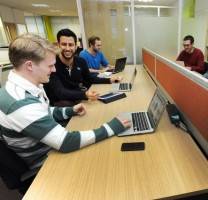August 5, 2015
Special edition of Ergonomics in Design focuses on sedentary work 0
 The Human Factors and Ergonomics Society (HFES) has published a special edition of its in-house journal dedicated to the much discussed topics of sedentary working and the need for us to get out of our seats. You’ll have to pay for it however, although individual sections are available for a one off cost. HFES claims to be the world’s largest scientific association for human factors and ergonomics professionals, with more than 4,800 members worldwide. The July issue of their journal Ergonomics in Design looks at the range of ailments associated with sedentary working, including obesity, heart disease and diabetes, weighs up what can be done to change the way people work, as well as the benefits and possible downsides to the most commonly suggested solutions, including sit-stand workstations, alternative seating designs and – God help us – treadmill desks.
The Human Factors and Ergonomics Society (HFES) has published a special edition of its in-house journal dedicated to the much discussed topics of sedentary working and the need for us to get out of our seats. You’ll have to pay for it however, although individual sections are available for a one off cost. HFES claims to be the world’s largest scientific association for human factors and ergonomics professionals, with more than 4,800 members worldwide. The July issue of their journal Ergonomics in Design looks at the range of ailments associated with sedentary working, including obesity, heart disease and diabetes, weighs up what can be done to change the way people work, as well as the benefits and possible downsides to the most commonly suggested solutions, including sit-stand workstations, alternative seating designs and – God help us – treadmill desks.































July 6, 2015
Humans will remain at the heart of the emerging digital workplace
by Maciej Markowski • Comment, Flexible working, Technology, Workplace design
(more…)